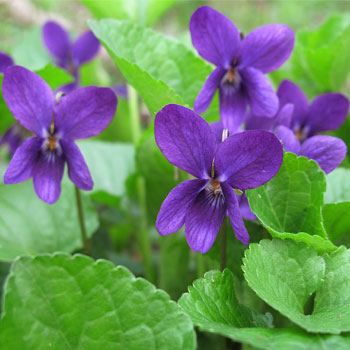你是我的紫香堇:谁藐视这日的事为小
歌咏紫香堇的诗人在欧洲文坛上多不胜数,有大文豪歌德和雪莱等。
最为西方小朋友们熟知的是简.泰勒(Jane Taylor, 1783-1824)的《紫香堇》(The Violet)。简.泰勒是诗歌《一闪一闪亮晶晶》的作者,这首歌人人会唱,可惜几乎没有人知道谁是词作者。

她创作的《紫香堇》言语简练、朗朗上口:
在绿色阴凉的花床上
?生长着谦卑的紫香堇;
它的茎弯曲,垂下头,
?好像要刻意隐藏。
(DOWN in a green and shady bed
?A modest violet grew;
Its stalk was bent, it hung its head,
?As if to hide from view.
没有明亮美丽的颜色
但仍是一朵可爱的花;
?本应为玫瑰凉亭添彩,
?而不是躲在那里。
(And yet it was a lovely flower,
?No colours bright and fair;
It might have graced a rosy bower,
?Instead of hiding there. )
在那儿它心满意足地开花。
?以谦逊的色彩排列;
然后散发出芬芳的气味,
?于沉默的阴影下。
(Yet there it was content to bloom;
?In modest tints arrayed;
And there diffused its sweet perfume,
?Within the silent shade. )
让我去一趟山谷,
?看看这朵美丽的花;
我也要学会
?温柔谦卑地成长。
(Then let me to the valley go,
?This pretty flower to see;
That I may also learn to grow
?In sweet humility. )
我尤其喜欢维多利亚时代的几位著名诗人关于紫香堇的小诗。
与雪莱、拜伦齐名的湖畔派诗人威廉·华兹华斯(William Wordsworth)在《失落的爱》(The Lost Love)中把爱人比作紫香堇:
她住在无人踏足的小路上,
在鸽子溪边安家,
那儿无人赞颂这位姑娘,
也很少有人爱她。
(She dwelt among the untrodden ways
Beside the springs of Dove:
A maid whom there were none to praise
And very few to love.)
她像一朵紫香堇
半掩在长满青苔的石头旁
美丽如一颗星,一颗孤星
闪烁在天边。
(A violet by a mossy stone
Half-hidden from the eye!-
Fair as a star, when only one
Is shining in the sky.)
她默默无闻地活着,没有几个人
知晓她何时死去;
当露西躺在坟墓里,哦
对于我已经非同往昔。
(She lived unknown, and few could know
When Lucy ceased to be;
But she is in her grave, and, oh,
The difference to me!)
这首诗充满了强烈的张力和压抑感,美丽如紫香堇、却不为人知的露西的死也许不会改变他人的生活,却让诗人无比伤心和失落,因为他深深爱着她。
维多利亚时代最著名的天才女诗人克里斯蒂娜.罗塞蒂(Christina Rossetti)也以紫香堇为主题,写了一首《挽歌》(A Dirge):
她像春天的紫香堇一样芬芳
和夏日的玫瑰一样美丽,
但盛放的玫瑰是脆弱的
紫香堇也如此。
她也是这样的
如今她躺着
泥土盖住了她紧闭的双眼,
默默地死在黑暗里。
(She was as sweet as violets in the Spring
As fair as any rose in Summertime,
But frail are roses in their prime
And violets in their blossoming.
Even so was she,
And now she lies,
The earth upon her fast-closed eyes,
Dead in the darkness silently. )
芬芳的春紫香堇再也不会发芽,
玫瑰在一个早晨盛开和枯萎。
如此迅速地凋零,
她们的美丽转瞬成空。
她一定要死吗
永远
像岸上的沙子一样寒冷
对喜悦和悲伤毫无热情?
(The sweet Spring violets never bud again,
The roses bloom and perish in a morn;
They see no second quickening lying lorn;
Their beauty dies as though in vain.
Must she die so
For evermore,
Cold as the sand upon the shore,
As passionless for joy and woe?)
不,她比褪色的花朵更有价值,
应该变成美丽的紫色果实:
挂在葡萄藤上,其根
永恒地扎在土里。
另一个太阳
不是我们的这个太阳
确实使她的花朵凋谢
但是她的每一颗葡萄都成熟了。
(Nay she is worth much more than flowers that fade,
And yet shall be made fair with purple fruit:
Branch of the Living Vine, whose Root
From all eternity is laid.
Another Sun
Than this of ours
Has wither up indeed her flowers
But ripened her grapes every one)
罗塞蒂是位虔诚的英国国教教徒,主要写宗教诗歌。这首诗反映的是“死亡与复活”的主题,死去的女人可以期待重生,就像枯萎的花可以在另一个太阳的照耀下结出美丽的紫色果实。
她的另一首《谁藐视这日的事为小?》(Who hath despised the day of small things?)用词精炼、想象力丰富,至今仍被广泛引用:
我像紫香堇一样归隐且芬芳
快乐如雏菊的人很少,
依旧从卑微的位置仰望太阳,
依旧使寒冷的空气飘着香。
虽然半醒的春天缓缓徐来,
高耸的林木荒芜苍凉
雏菊和紫香堇拥有最遥远的热量
盛开,使一切更美。
(As violets so be I recluse and sweet,
Cheerful as daisies unaccounted rare,
Still sunward-gazing from a lowly seat,
Still sweetening wintry air.
While half-awakened Spring lags incomplete,
While lofty forest trees tower bleak and bare,
Daisies and violets own remotest heat
And bloom and make them fair. )
诗歌标题“谁藐视这日的事为小”来自《圣经》中的《撒迦利亚书》(Book of Zechariah) 4:10:“所罗巴伯的手,立了这殿的根基。他的手也必完成这工。你就知道万军之耶和华差遣我到你们这里来了。谁藐视这日的事为小呢。这七眼乃是耶和华的眼睛,遍察全地,见所罗巴伯手拿线铊就欢喜。”(The hands of Zerubbabel have laid the foundation of this house, and his hands will complete it. Then you will know that the LORD of Hosts has sent me to you. For who has despised the day of small things? But these seven eyes of the LORD, which scan the whole earth, will rejoice when they see the plumb line in Zerubbabel’s hand)
话说公元前586年以色列灭国,大部分犹太人被掳到巴比伦,在那里经历了70年的流亡生活。波斯王朝取代巴比伦后,容许犹太人返回耶路撒冷重建家园。以色列回到耶路撒冷,开始建殿,但不久受到敌人的各种干扰和干预,被迫停工。经过一番波折,首领所罗巴伯受神的感召,带领百姓继续建殿。以色列百姓看到新殿的根基比当年所罗门建的小的多,有了鄙视之心。有些见过从前圣殿的人,禁不住哭了起来。可是神告诉以色列人不可藐视这个工程,并应许他们:新建圣殿的荣耀将要大于旧殿的荣耀。
女诗人通过紫香堇和雏菊来反映她的宗教信仰:在神的眼里,做比不做更重要。即使再卑微渺小,也要贡献芬芳和热量,使寒冷的空气飘着香。神会护佑那些忠心依靠他的人,今天做的微小的事情不代表是徒劳,耶和华的七眼无所不见,他看好的事情,不可能是没有价值的。
诗歌中的紫香堇又代表圣母玛利亚,安静、虔诚、低调,拥有自我牺牲精神。雏菊象征着圣徒,在恩典中成长并传播自己的信仰,从而创造奇迹,并获得重生。
值得一提的是,维多利亚时代(1837-1901年)是大英帝国的顶峰,领土达到了3600万平方公里,大英帝国的经济占全球的70%。这个时期的文坛充满了活力,多位诗人在诗歌改革方面大胆尝试,展现出丰富的想象力,真实反映了时代面貌和精神,为二十世纪的现代诗歌开辟了道路。